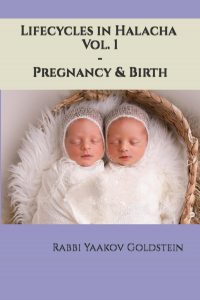
Hanhagos- Good deeds to be followed during pregnancy:
- Matters to be careful in to protect woman during childbirth r”l:[1]
The following matters are a source of protection for a woman during childbirth:
- Being careful in the laws of Nidah.
- Being careful in Hafrashas Challah. [Some women are accustomed to separating Challah in the ninth month as a Segula for an easy birth.[2]]
- Being careful in lighting the Shabbos candles.
- Rav Acha adds that properly guarding Shabbos and not washing the dirt off of their children’s clothing on Shabbos.[3]
- Not transgressing a vow.[4]
B. Looking at holy images:[5]
Throughout her pregnancy, a woman is to try to see holy images. She should visit the synagogues and halls of study and see and hear the Torah discussions of the Torah scholars and righteous men. These words of Torah will enter into her ears and sanctify the child that is within her, as the fetus hears and understands everything. So was done by the mother of Rebbe Yehoshua Ben Chanania when she was pregnant with him and for this reason she had a very holy child who was a great Torah scholar.[6]
- Charity:[7]
During the pregnancy, the woman is to be careful to donate some money to charity each morning.
Erev Shabbos: Likewise, money should be donated to charity prior to lighting candles on Erev Shabbos.[8] It should be donated towards the charity of Rabbi Meir Baal Haneis. These moneys should be pledged to charity with saying Beli Neder, without binding oneself with a vow. In one letter, the Rebbe mentions that she should add 18 pennies towards the amount that she normally gives to charity on Erev Shabbos.[9]
- Checking Mezuzos:[10]
During the pregnancy, the Mezuzos of the home are to be checked to ensure that they are Kosher if they have not been checked in the previous 12 months.
E. Extra Torah study and Mitzvah observance:[11]
During the pregnancy, a woman is to increase her study of Torah and Mitzvah observance for the benefit of the child.
F. Reciting the daily Tehillim:[12]
The husband is to be particular in reciting the daily Tehillim.
G. Fasting in the ninth month:[13]
Some are accustomed for the husband and wife to fast during the ninth month of pregnancy, or alternatively to redeem the fast with charity, and pray on behalf of an easy birth. [Practically, it is no longer customary to fast.]
_______________________________________________
[1] Shabbos 31b; Brachos 31b; See Divrei Malkiel 2:94; Sefer Shemiras Haguf Vihanefesh [Lerner] 144:1; 262:1; Shevach Habris 1:2
[2] Nitei Gavriel 56:13
[3] Shabbos 32a
[4] Shabbos 32b
[5] Shevet Hamussar 24; Toras Menachem 5750 3:179 “it is known the custom of women while they are pregnant to be very careful not to see impure items but rather only pure and holy items”; Likkutei Sichos 25:309; Shevach Habris 1:1; See Sichos Kodesh 5737 Sicha 7
[6] See Yerushalmi Yevamos 1:6; Rashi and Rav Ovadia Bartenura on Avos 2:8
[7] Igros Kodesh 3:387; 5:105, 220, 327; 6:104; 7:108, 303; Igeres Hateshuvah of Rabbeinu Yona 82; Otzer Habris 3:7:6; Shevach Habris 1:4
[8] Kitzur SHU”A 75:2; Kitzur Dinei Shabbos 4 footnote 1; Minhag Yisrael Beyadeinu p. 38
[9] Igros Kodesh 5:327
[10] Igros Kodesh 5:105; 220; 6:104; 7:303; Shevach Habris 1:6
[11] Sefer Hasichos 5747 Vol. 1 p. 146, Toras Menachem 5747 2:37; Sichos Kodesh 5737 Sicha 7; Shevach Habris 1:21
[12] Igros Kodesh 6:104
[13] Shelah Miseches Tamid; Siddur Shelah; Kitzur Shelah; Nitei Gavriel 56:14



Leave A Comment?
You must be logged in to post a comment.